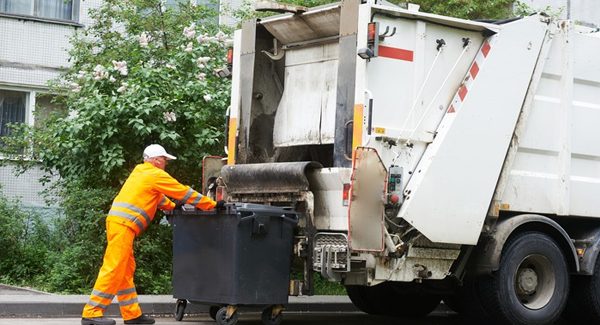The City of Chicago is a world-class city. For those who have traveled to other major cities, it won’t come as a surprise that Chicago is also a very clean city due in part to the City’s strict enforcement of its Sanitation Code.
Chicago’s Department of Streets and Sanitation employs numerous inspectors to evaluate and observe reports of garbage outside of respective containers and dumpsters. The Chicago Sanitation Code was created to enforce such violations and is comprised of a series of municipal ordinances that require cleanliness and the safe disposal of all trash and debris.
Community association board members and property managers need to be aware of the City’s aggressive policing of overflowing dumpsters within Chicago’s city limits. For instance, the warmer months create more foot traffic and there is more construction within the City during this time as well. This creates ample opportunity for a City inspector to be near your association’s property multiple times a week.
The threshold for proving a violation of the Chicago Sanitation Code is quite low. The City only needs to demonstrate a prima facie (or at first glance) case in order to prove liability. This is often evidenced by photographs taken by an inspector of trash outside of the proper container or dumpster. If a prima facie case is demonstrated, then the only other component the City needs to demonstrate is that the association owns the property that is cited.
Once these two conditions have been met, then the City can (and will) assess a fine anywhere from $200-$500 for each respective violation. As you can imagine, this is quite the revenue generator for the City of Chicago, Accordingly, the City has a vested interest in not only keeping the city limits clean but prosecuting these violations.
To minimize the risks of being cited by the City of Chicago for a violation of the Sanitation Code, here are ten recommendations your condominium, homeowner, or townhome association should consider.
- Keep all closures tightly shut on garbage containers and dumpsters.
- Never let any raw trash sit outside of a garbage container or dumpster. If it is in sight, a City inspector can take a quick photograph and the association would be susceptible to a violation.
- Always call ahead for larger item pick-up to ensure that the containers do not overflow.
- Monitor your garbage, especially when tenants/residents are moving out. They can leave behind larger items and create more trash than usual. Consequently, ensure that multiple pick-ups are scheduled instead of a potentially overflowing dumpster or garbage container.
- Associations should provide sufficient garbage containers and/or dumpsters for all tenants/residents and arrange for private or licensed scavenger pick-up service.
- If your association contains commercial spaces or restaurants, be sure to use and maintain a clean grease box in addition to normal garbage containers.
- Always ensure your association breaks down cardboard boxes and other recyclables before leaving them for collection.
- All dumpsters should have information prominently displayed on the exterior identifying the user of the dumpster in addition to the scavenger company servicing each dumpster.
- Call the City’s “3-1-1” line if you notice others not belonging to your association who are dumping in your respective garbage containers or dumpsters. Reporting can sometimes assist in avoiding liability.
- Be sure to work with your association’s legal counsel if you have any questions on creating Rules and Regulations for garbage issues or to defend against violations of the City’s Sanitation Code.
An attorney can help the association’s Board of Directors and/or property manager analyze the issues facing your community by navigating the ever-changing local laws and ordinances. They can assist in formulating a strategy to implement and create Rules and Regulations best suited to meet the legal and practical needs of the community association.
Legal counsel can also collaborate with your Board and/or property management to ensure contracts with scavenger pick-up services are in the association’s best interests. Further, an attorney can review commercial agreements prevalent in mixed use (commercial/residential) buildings. For example, if there is a restaurant located within your association’s property, an attorney can review the agreement to ensure the establishment’s obligations regarding garbage and/or grease disposal are clearly delineated.
By being proactive and properly implementing policy and rules addressing Chicago’s Sanitation Code, the association’s board members and/or property management can save money, time, and stress by decreasing the potential for violations and/or liability.
If your condominium, homeowner, or townhome association has questions regarding Chicago’s Sanitation Code or is interested in reviewing/adopting rules to ensure you are in compliance with the Code, do not hesitate to contact our law firm.
Since 1983, KSN has been a legal resource for condominium, homeowner, and townhome associations. Additionally, we represent clients in real estate transactions, collections, landlord/tenant issues, and property tax appeals. We represent thousands of clients and community associations throughout the US with offices in several states including Florida, Illinois, Indiana, and Wisconsin.
Please call 855-537-0500 or visit www.ksnlaw.com.
—
This article is made available by the lawyer or law firm publisher for educational purposes only as well as to give you general information and a general understanding of the law, not to provide specific legal advice. By reading this article you understand that there is no attorney client relationship between you and the article author. This article should not be used as a substitute for competent legal advice from a licensed professional attorney in your state. © 2019 Kovitz Shifrin Nesbit, A Professional Corporation.

